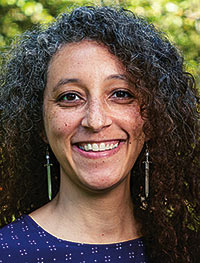Spotlight on: Sarah Pinsker

Sarah Pinsker’s first professional sale was “20 Ways the Desert Could Kill You” in 2012. She followed that with the Sturgeon Award-winning “In Joy, Knowing the Abyss Behind”, also her first Nebula Award-nominated story. She has since won the Nebula Award for novelette “Our Lady of the Open Road.” Her 40+ stories have appeared in Asimov’s, Strange Horizons, F&SF, Lightspeed, and Uncanny, among others, and numerous anthologies. Her first collection, Sooner or Later Everything Falls Into the Sea: Stories will be published by Small Beer in 2019. She is also a singer/songwriter and has toured nationally behind three albums on various independent labels. She lives with her wife and dog in Baltimore MD.
You’ve had a couple of stories come out to great acclaim recently. Tell us about current Nebula Award finalist “And Then There Were (N-One)” – what’s it about, and why did you write it?
“And Then There Were (N-One)” is a science fiction murder mystery set at a convention of Sarah Pinskers. It rose from a confluence of events that took place at a writing retreat. Someone had brought a box of marshmallow peeps and set them on a plate. By Saturday evening there were ten, and that somehow morphed into a Peep-by-Peep recreation of the deaths in Agatha Christie’s And Then There Were None. (<storify.com/UncannyCabin/twice-upon-a-time-there-was-an-uncanny-cabin> documents the evening, which also involved whiskey and Hamilton). That plus a contest prompt of “a triptych of memories” and I woke up Sunday morning with the idea of a murder at a multiple-selves convention. They weren’t Sarah Pinskers yet; that came several drafts later.
On a visit to my mother’s, I found my childhood copy of the Dr. Seuss fill-in-the-blanks My Book About Me, which I had filled in around the age of eight. Alongside questions about how big your shoes are and how many books you’ve read (I think my answer was “a million”), there’s a double page spread of “What do you want to be when you grow up?” I had circled or written in about twenty things, everything from astronaut to “president’s dog trainer” (that one was a write-in!) Looking at that got me thinking about how taking one path can sometimes close others off. At that moment I had the horrifying realization that I needed to do a monumental authorial self-insertion. And really, that was when the story finally fired; it got its heart and moved beyond high-concept gimmickry when I understood I needed to use details from my own life, paths travelled and untraveled, all of which lead to new paths that I never had the opportunity to travel. It’s a fun and bizarre exercise, especially for someone who is decision-averse. Some of it is “real” and some of it isn’t, but what does real mean in a fictional setting?
You have two stories on the Nebula ballot now. Tell us about “Wind Will Rove”.
My novelette “Wind Will Rove” was born at an old-time music jam I went to with my aunt, who also plays guitar. The guitar part is easy: everything is in the same key, and your job is to play two or three chords behind the fiddle players and stay out of their way. Since that doesn’t take much attention, my hands did the playing and my mind started paying attention to the details in a sort of ethnographic way: who sat where, who had control of the song, etc.
Someone had given me a story seed that told me I needed to write a space story, and someone else gave me a seed that said “I thought it was a kiwi,” pointing out that a kiwi can be “a fruit, a bird, or a New Zealand national,” and I started thinking about how language and history distort over time, so somebody might be aware of one definition but not all three, and arrive at a textual misread. The combination of those three elements became a story about old-time fiddlers in a middle generation on a generation ship. I’m fascinated by the idea of those middle generations, and the idea that someone idealistically set off on that journey, removing the choice for their descendants. I also love playing with the question of what becomes an abstract concept in that setting. Melodies can be kept static and passed down intact, but do the titles or lyrics mean anything at all to the people playing them? What’s worth keeping, and why?
I took both “And Then There Were (N-One)” and “Wind Will Rove” to the Sycamore Hill workshop, a year apart, but in the opposite order. I love Sycamore Hill and try to go any time I’m invited. It pushes me to bring – and to write! – my most ambitious stories. Then I have to sit down with all my notes from the critiques and sort out whom I agree with. I’m lucky to have a couple of critique situations like that in my life. Not only do I get great advice on my own stories, but critiquing stories by great writers ups my game.
Which one story of yours are you most fond of, that you’d like to point our readers toward?
I don’t think I can pick just one! Probably one of the two above, to be honest, which is nice since you always want to be able to say your most recent work is your best or favorite, right? The descriptions of music in “Wind Will Rove”, and the translations of the past, for good or bad, made me happy, as did the easter eggs in “And Then There Were (N-One)”.
I like to think my stories are hopeful, even when things look dire. I’m into hope. I think I write a lot of people trying to figure out how to navigate really lousy situations as best they can. I like examining human-level problems and solutions against science fictional or fantastic backgrounds. I also love writing queer characters in situations where their queerness is not part of the crisis at hand.
What’s the particular appeal of science fiction for you? Why write that instead of, say, mysteries or literary fiction?
I can’t remember a time before I read science fiction, so it was natural that I gravitated toward writing it. My father always had subscriptions to the SF magazines, and his library includes hundreds of anthologies and collections, so I read a lot of short fiction growing up. Novels too, but I remember devouring all the year’s bests. I also had a grade school teacher who taught SFF stories. I remember reading “Of Mist, And Grass, And Sand” with her, and later discovering Dreamsnake. Also “Harrison Bergeron”, “The Nine Million Names of God”, “The Ones Who Walk Away From Omelas”, “The Ship Who Sang…” She came to the Asimov’s anniversary reading last year. I’m not always good at thank yous, but I like to think the people who influenced me can see their influence pretty directly.
I spoke to a community college last week and was asked a question about why I choose to write SF. First, to me, lit fic is just another genre, with its own conventions. I think a lot of my own work falls into the lit/SF overlap. Good realist fiction is lovely, but I love the expanded palette that “what if” allows.
Your short stories are justly celebrated. Any plans to write a novel?
I’ve written a novel! It’s set in the near future of “Our Lady of the Open Road”, where live music has been driven underground. It’s proven to be a great setting for exploring not just future music technology and its effect on musicians, but also isolation and community and what we allow to happen in the name of safety, which are timely discussions.
You’re not just a writer, but also a musician. Tell us about that side of your work.
To me, fiction and music are both sides of the storytelling coin – another expanded palette. I wrote fiction for years, and then put it aside when my music started going well. Three albums and several years of touring later, I started writing fiction again. Songwriting distills a story down to its absolute essence. After three verses and a chorus, even a flash story feels like enough room to write an epic. Lyric-writing punches up the rhythms of fiction too. Like a lot of writers, I read everything out loud, and a story that’s working well has a beat to it.
I get a kick out of trying to translate music into prose, as well. “Wind Will Rove”, “Our Lady of the Open Road”, “A Song Transmuted” – I think the trick is not to describe what the music sounds like, but what a song stirs in the players and in those listening. If I conjure that feeling right, the reader can overwrite whatever sound they’re hearing.
Is there anything else you’d like our readers to know about you or the work you do?
I’m a research fiend, even if it doesn’t all wind up on the page. My degree is in history, and I am a very happy person if you point me at an archive and let me loose. I love collecting the tidbits that are true and yet too weird to make believable speculative fictions.
Tell us about your upcoming collection.
Small Beer Press will be publishing my collection Sooner or Later Everything Falls Into the Sea: Stories in 2019. It’ll have a mix of reprints from online and print magazines, as well as an original story. The Small Beer folks are awesome humans and I love their stuff. If I walk into a dealers’ room where they have a table, I usually walk out with everything on it. I’m tremendously honored to be included in their catalogue, shoulder to shoulder with some of my favorite authors.
This and more like it in the April 2018 issue of Locus.
 While you are here, please take a moment to support Locus with a one-time or recurring donation. We rely on reader donations to keep the magazine and site going, and would like to keep the site paywall free, but WE NEED YOUR FINANCIAL SUPPORT to continue quality coverage of the science fiction and fantasy field.
While you are here, please take a moment to support Locus with a one-time or recurring donation. We rely on reader donations to keep the magazine and site going, and would like to keep the site paywall free, but WE NEED YOUR FINANCIAL SUPPORT to continue quality coverage of the science fiction and fantasy field.







